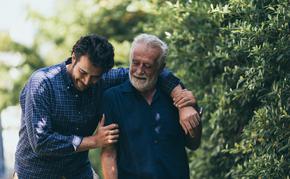The views expressed in our content reflect individual perspectives and do not represent the authoritative views of the Baha'i Faith.
Since the pandemic began, I’ve noticed a trend towards healing childhood trauma. Interestingly, at the same time, healing trauma has also become the topic of multiple conversations in my community.
It seems like many, many people suffer from the after-effects of some kind of trauma. But how can we heal that trauma? Let’s first understand what trauma is, as the American Psychological Association defines it:
… any disturbing experience that results in significant fear, helplessness, dissociation, confusion, or other disruptive feelings intense enough to have a long-lasting negative effect on a person’s attitudes, behavior, and other aspects of functioning. Traumatic events include those caused by human behavior (e.g., rape, war, industrial accidents) as well as by nature (e.g., earthquakes) and often challenge an individual’s view of the world as a just, safe, and predictable place.
However, what makes something deeply disruptive or disturbing depends on one’s perception of the event. For example, for some people the death of a loved one can be severely traumatizing, lasting for many years, while others avoid such long-term impact by passing through a relatively short-term grieving process. A celebration of a life well-lived may also occur, depending on one’s cultural beliefs or faith in relation to death and the afterlife.
RELATED: Collateral Beauty: the Silver Linings in Tests, Loss, and Grief
I’d like to share how healing trauma through movement and music has helped me overcome suffering in my life. First, as the Baha’i teachings point out in this talk Abdu’l-Baha gave in Paris:
If we suffer it is the outcome of material things, and all the trials and troubles come from this world of illusion.
For instance, a merchant may lose his trade and depression ensues. A workman is dismissed and starvation stares him in the face. A farmer has a bad harvest, anxiety fills his mind. A man builds a house which is burnt to the ground and he is straightway homeless, ruined, and in despair.
All these examples are to show you that the trials which beset our every step, all our sorrow, pain, shame and grief, are born in the world of matter; whereas the spiritual Kingdom never causes sadness. A man living with his thoughts in this Kingdom knows perpetual joy. The ills all flesh is heir to do not pass him by, but they only touch the surface of his life, the depths are calm and serene.
The trauma inflicted by the material world can happen in many different ways. Untimely events like earthquakes or armed conflict can have a detrimental effect financially or emotionally from losses of property or loved ones. Traumatic events can also be induced by a caregiver’s maltreatment through forms of physical, emotional or mental abuse. Consider even the emotional distancing of a parent too busy to tend to the needs of the child, too intolerant of unacceptable actions, or too lavish in distracting the child with diversions.
Some of these traumas can adversely affect an individual who relives the experiences again and again in relationships far into adulthood. The traumas can also result in a person becoming addicted to alcohol, sex, opioids, or bullying. There is also evidence of intergenerational or multigenerational trauma that is passed down through our genes, but this subject must await further research.
Trauma can affect individuals cognitively, behaviorally, emotionally, or physically. Cognitive responses to trauma can appear as ambiguity, indecisiveness, recklessness, and absentmindedness. Behavioral responses can engender insomnia, neurosis, addiction, or irritability. Emotional reactions can be seen as depression, anxiety, quarrelsomeness, fatality, or futility. Physical responses to trauma can even show up as stomach pains, tightness in the chest, headaches, and psychosomatic complaints. Such reactions can keep a person in a state of victimhood as circumstances appear overwhelming or irreconcilable.
The stages of overcoming trauma may be linked to internal healing work in order to move forward with one’s life. Acknowledging that the feelings are valid, sharing those feelings with someone, and getting back into a normalized routine are all essential for healing. Exercise is another important tool to use to heal trauma, as physical movement opens lines of communication between mind and body. We all hold the experiences of our trauma in the body, which can take the form of various ailments or diseases if not addressed. These experiences also show up in our postures, our eyes, our expressiveness, or our self-assuredness.
Another form of therapy – exercise paired with music for healing internal wounds – has become a favorite form of therapy for me. If you have unhealed trauma from your past, this kind of healing modality might be therapeutically worthy of consideration.
Coming from a musically-focused family has possibly given me a predisposition to love music for the sake of music – but I’ve also learned how the spiritual connection music makes with the soul has proven to be therapeutic. For me, taking the time to do any kind of movement alone through dancing, singing, creative expression, and sometimes just an intense workout with various types of music to suit the mood offers a great way to move through trauma. Abdu’l-Baha, the son and successor of Baha’u’llah, the founder of the Baha’i Faith, wrote: “… in this new age [Baha’u’llah] the Manifest Light hath, in His holy Tablets, specifically proclaimed that music, sung or played, is spiritual food for soul and heart.”
This “spiritual food” analogy tells us that we can rely on music for movement and meditation, as well as for solving problems while connected with our intuitive selves. When exercising and moving with music, the activity and listening heightens the moment, releases endorphins, rejuvenates the body, and engenders joyfulness in our souls and hearts. Exercise helps balance the nervous system and release anxieties, while the music beckons the spirit to rise to loftier realms of awareness and experience.
RELATED: Can Music and Melody Awaken Our True Nature?
Mindful that the mind is powerful, due care should be exercised lest abysmal thinking shatter well-being. The take-away lesson: by getting fully into your body and your soul through movement and music, traumas do heal, as this passage from Abdu’l-Baha in the Baha’i writings clearly indicates:
Praise be to God that thou hast two powers: one to undertake physical healing and the other spiritual healing. Matters related to man’s spirit have a great effect on his bodily condition. … Therefore, treat thou the sick with both powers. Spiritual feelings have a surprising effect on healing nervous ailments.
The combination of active bodily movement and joyful, soulful music can have a tremendous impact on your entire being, and help release the trauma and suffering you’ve undergone in your life.

















Comments
Sign in or create an account
Continue with Facebookor